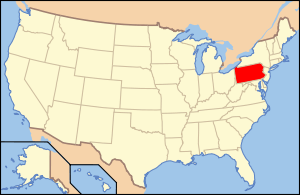Pittsburgh Science and Technology Academy
| Pittsburgh Science and Technology Academy | |
|---|---|
|
Dream. Discover. Design. | |
| Location | |
|
107 Thackeray St. Pittsburgh, PA 15213 United States | |
| Information | |
| Type | Public - Magnet |
| Established | 2009 |
| School district | Pittsburgh Public Schools |
| Principal | Mr. Shawn McNeil |
| Teaching staff | 23[1] |
| Grades | 6–12 |
| Enrollment | 548 as of September, 2013[2] |
| Color(s) | White and blue |
| Mascot | Sci-Tech Thundersharks |
| Newspaper | The Byte (retired), The Sextant (Future) |
| Website | |
|
Henry Clay Frick Training School for Teachers | |
|
Northern side of the building | |
| Location | 107 Thackeray Ave., Pittsburgh, Pennsylvania |
| Coordinates | 40°26′36″N 79°57′29″W / 40.44333°N 79.95806°WCoordinates: 40°26′36″N 79°57′29″W / 40.44333°N 79.95806°W |
| Area | 1 acre (0.40 ha) |
| Built | 1927 |
| Architect | Ingham & Boyd |
| Architectural style | Classical Revival |
| MPS | Pittsburgh Public Schools TR |
| NRHP Reference # | 86002668[3] |
| Significant dates | |
| Added to NRHP | September 30, 1986 |
| Designated PHLF | 2002[4] |
Pittsburgh Science & Technology Academy is a public school in the Oakland neighborhood of Pittsburgh, Pennsylvania, United States. It currently serves grades 6-12 in the Pittsburgh Public Schools. Its building was listed on the National Register of Historic Places on Sept. 30, 1986.[3][5]
History
Originally the building served as the home for the Henry Clay Frick Training School for Teachers, founded by Henry Clay Frick in 1927, which served a training school for teachers. In 1983 it became a middle school housed at Dilworth School in the Pittsburgh neighborhood of East Liberty. Pittsburgh Frick 6–8 Middle School moved to the building in 1986, and was temporarily located at Reizenstein which is called the Barack Obama Academy of International Studies 6-12. The Barack Obama Academy of International Studies 6-12 is now located in the former Peabody High School building in East Liberty. In June 2009, staff working on The Pittsburgh Science and Technology Academy received possession of the Frick International Studies Academy building. Sci-Tech officially opened to students in September 2009 after a pilot project by graduate students at Carnegie Mellon Heinz College.[6][7]
Operating Schedule
Pittsburgh SciTech offers a block-schedule of classes; using this structure it allows students 80 minute classes. A small student to teacher ratio provides a safety net so that each student can receive individual attention in areas they may need extra help in as well as being moved to advanced classes if they need more of a challenge. Field trips to local attractions in the Oakland area are plentiful and make use of local libraries, museums, universities and seasonal attractions. Also, students are given 60 minutes a day to entertain themselves in a list of activities which are not school related, this is called Activity Period.
Concentrations
Pittsburgh Science and Technology Academy offers four fields of science for students to focus on. These fields, named "Concentrations", are split into the following categories:
- Computers and Connections
- Body and Behavior
- Form and Function
- Environment and Energy
These sub-categories cover a wide range of careers and offer early experience in classes they would not study otherwise. Students pick their concentration at the end of their Ninth-grade year. The pickings are chosen in a weighted lottery, biased on grades, behavior, and attendance.
Computers and Connections
The Computers and Connections concentration focuses on teaching students computational thinking; breaking hard problems up into easier steps.
Body and Behavior
In the body and behavior concentration, students focus on aspects of health and science. Also students are given accelerated teaching about different professions and health careers.
Form and Function
Form and Function focuses on engineering and the different aspects of it. The students have won a "Dream Team" competition for best design in the past.
Environment and Energy
Environment and Energy teaches students about Environment and Energy in the form of hands on activities in Panther Hollow creek and elsewhere, and learning about the aspects of each.
Enrollment
- Total Students: 548
- African-American: 255 (47%)
- American Indian: 3 (1%)
- Asian: 16 (3%)
- Hispanic: 11 (2%)
- Multi-Racial: 38 (7%)
- White: 225 (41%)
- Male Students: 363 (66%)
- Female Students: 185 (34%)
References
- ↑ "Pittsburgh Science and Technology: Teaching Staff".
- ↑ "Pittsburgh Science and Technology: School Information". PPS Web Site. Retrieved 2007-05-12.
- 1 2 National Park Service (2009-03-13). "National Register Information System". National Register of Historic Places. National Park Service.
- ↑ Historic Landmark Plaques 1968-2009 (PDF). Pittsburgh, PA: Pittsburgh History & Landmarks Foundation. 2010. Retrieved 2011-07-28.
- ↑ "Pennsylvania Historic Resource Survey Form: Frick Middle School" (PDF). April 1986. Retrieved 2010-06-08.
- ↑ http://www.pps.k12.pa.us/pst/site/default.asp
- ↑ http://www.heinz.cmu.edu/newsletter-pages/pgh-sci-tech/index.aspx


